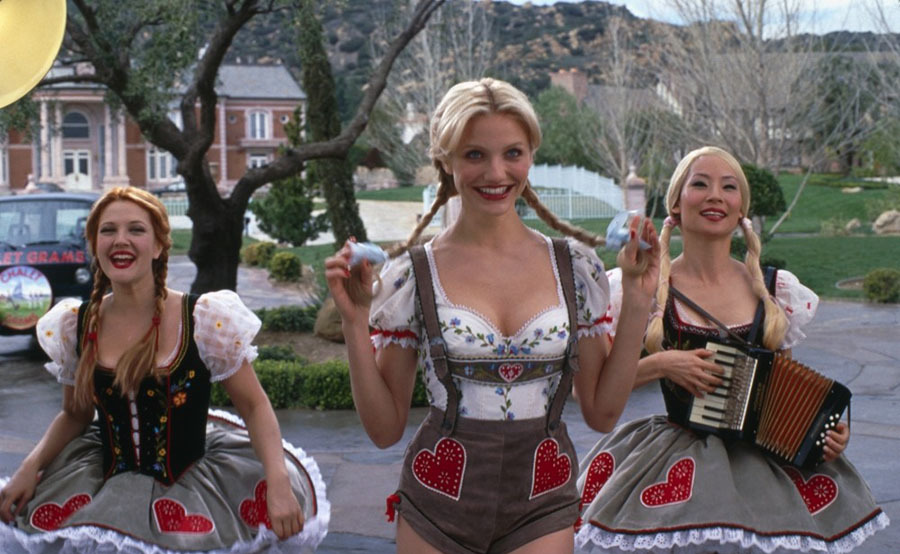The outgoing year was not the best in terms of releasing restarts or sequels to high-budget franchises (with the possible exception of Toy Story). After the picture “Sony Pictures“ Men in Black: International ”did not show itself very well at the box office and did not become the hit the studio was counting on, interest in another project of the company -“ Charlie's Angels ”- increased.
The film's director Elizabeth Banks has repeatedly noted that her picture is not a restart of the franchise, but rather a continuation of the story that began in the mid-1970s.
Then, on the ABC channel, the premiere of the series “Charlie's Angels” took place, which was a rather bold and somewhat unusual project for the film industry of those times, because the roles of special agents, contrary to the canon, went to women. "Angels" were graduates of the police academy, who were not allowed to operational work. Then they hired a private detective agency Charlie Townsend, who talked to them on the radio or through an assistant John Bosley.
Almost 20 years later they returned to the plot with a trio of “angels” from Townsend’s agency. In the 2000s, a restart of Charlie's Angels seemed like a real event in pop culture. The main roles were played by Cameron Diaz, Drew Barrymore and Lucy Liu, while Bosley was played by Bill Murray. The film gathered a solid box office, and three years later the premiere of the sequel, called Charlie's Angels: Just Ahead, premiered.
- Shot from the movie "Charlie's Angels"
- © kinopoisk.ru
Banks (who made her film debut as a screenwriter) combined the two previous projects about Charlie's angels, but shifted her focus to feminist rhetoric. The monologue of Sabina Wilson (Kristen Stewart) anticipates this tone throughout the story on a meeting with an enemy named Joni Smith: she unnecessarily famously and somewhat repulsively argues that women can do whatever they want and how they want.
While Sabina obsessively explains to her counterpart the postulates of her gender policy, another “angel” Jane (Ella Balinska) neutralizes the guard, and in tandem with Sabina surrenders Smith to John Bosley (Patrick Stewart). In fairness, here Bosley is not the codename of a mentor, but something like a title. There are a lot of Bosley: they work with the "angels" around the world, because the Townsend agency is now a global spy network.
A year later, Sabina and Jane have to reunite to protect an IT person named Elena (Naomi Scott). She participated in the development of a device called "Calisto" - it is something like an inexhaustible source of energy, the potential of which can be used as a weapon. The project has not yet been brought to mind and can easily cripple, or even kill, a person working with him. Elena is trying to explain this to the authorities in the person of Sam Klaflin, however, as usual, he is only interested in profit. Then she turns to the Townsend for help.
A significant part of the film, Sabina, Jane and Elena, under the control of one of Bosley (performed by Banks), vainly try to steal a Calisto sample from the laboratory, and then just as unsuccessfully disrupt the sale of the device, as it is supposed, to the black market.
A sloppy narrative, carelessly scattered across different countries (from Germany to Turkey), hurts the eye, and the plot does not offer the viewer anything original. On top of that, Banks overloads it with feminist rhetoric and extremely ridiculous scenes, like the finale, where the "angels" from all departments of the agency demonstrate what the heroine Stuart says at the very beginning - that they can do whatever they want.
Despite the directorial and cameraman flaws (such as using tricks with shaky focus), Charlie's Angels has a number of high-quality visual effects, further enhanced by a bright production design and memorable outfits. Kim Barrett, who created the costumes for The Matrix, was responsible for them in the project.
- Shot from the movie "Charlie's Angels"
- © imdb.com
Probably, for many, Kristen Stewart will be a great discovery (especially for those who did not follow her career after the twilight franchise, which got tired of it). For her, the role in Charlie's Angels is to return to high-budget cinema after a series of indie and arthouse experiments. Since the time of the vampire saga (most likely severely restricting the public behavior of actors), Stuart has sought to get rid of the stigma of girlfriend Edward Cullen, therefore, radically changed the vector of actor’s self-development and image.
The filmography of the actress of recent years consists mainly of projects that affect the controversial aspects of female sexuality (Revenge of Lizzie Borden, Several Women). The strangely comedic Stuart in Angels paces like a wad of sapphic energy, and with his love of food he sometimes resembles the ever-living Brad Pitt from Ocean’s 11 Friends.
The picture justifies its existence by not repeating the scenic lines of the television series and feature films, but by offering the viewer new twists and turns in the story of special agents - from career opportunities for “retired angels” (spoiler: they are invited to become Bosley) to the growth of a private agency and opening offices around the world. True, all of this could have been done without a highly raised feminist flag.

